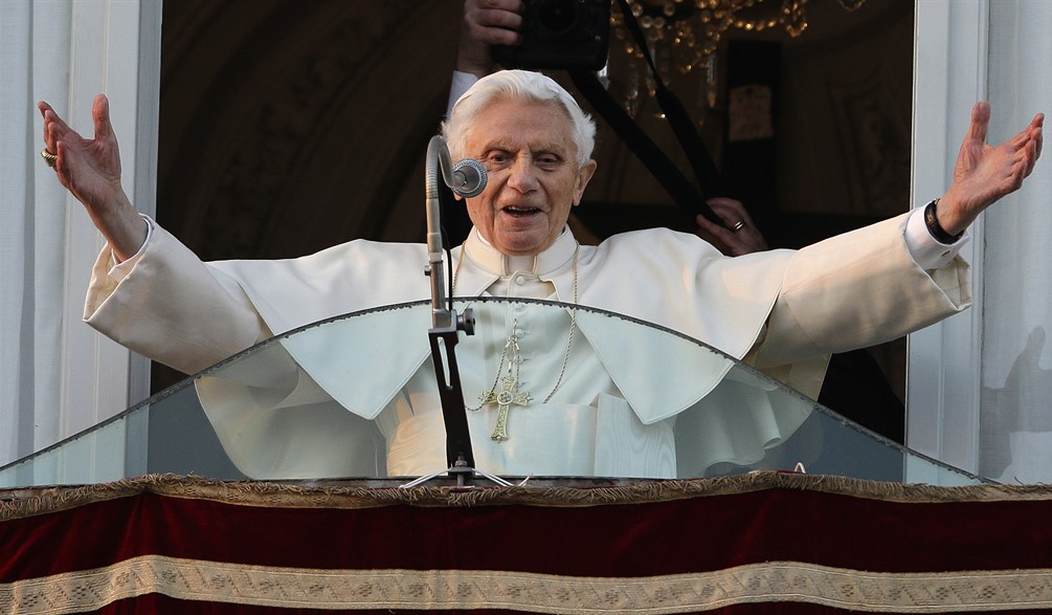Bad news for the mainstream media, it seems -- the secularization of the Catholic Church has hit reverse. Or so the Associated Press fulminates in an amusing report about the trend toward catechesis in the American Catholic Church and parishioners who, y'know, actually believe this stuff.
No, seriously ... that's the story. The liberal vanguard of the 1960s and 1970s has aged out of leadership, and newer generations are actually living their lives according to the doctrines of the church to which they belong. At the same time that the media has spent the last six months offering sympathetic looks at campus protesters because of their commitment to [checks notes] anti-Semitism and Hamas terrorism, the AP has a freak-out over an uptick in confession and chapel veils.
Given the context, this might have passed muster at the Babylon Bee:
Across the U.S., the Catholic Church is undergoing an immense shift. Generations of Catholics who embraced the modernizing tide sparked in the 1960s by Vatican II are increasingly giving way to religious conservatives who believe the church has been twisted by change, with the promise of eternal salvation replaced by guitar Masses, parish food pantries and casual indifference to church doctrine.
The shift, molded by plummeting church attendance, increasingly traditional priests and growing numbers of young Catholics searching for more orthodoxy, has reshaped parishes across the country, leaving them sometimes at odds with Pope Francis and much of the Catholic world. ...
They often stand out in the pews, with the men in ties and the women sometimes with the lace head coverings that all but disappeared from American churches more than 50 years ago. Often, at least a couple families will arrive with four, five or even more children, signaling their adherence to the church’s ban on contraception, which most American Catholics have long casually ignored.
They attend confession regularly and adhere strictly to church teachings. Many yearn for Masses that echo with medieval traditions – more Latin, more incense more Gregorian chants.
What did they expect to find? Unitarians?
Maybe that's what they hoped to find. And to be fair, some Catholics might prefer to find Unitarians there at times, too.
So let's step through a couple of the points made just in this excerpt. It's true that the post-Vatican II period saw a lot of liturgical changes, but much of that innovation has been discarded. The changes in that period stemmed less from the actual documents of Vatican II than they did from the contemporary changes around the Church and the mistaken impulse to be culturally relevant rather than doctrinally rigorous. This mainly happened over confusion between missionary work in evangelizing those outside the church and worship practice for those within it. The Vatican II documents never told people they could have "casual indifference to church doctrine"; that came from a desire by mediocre leadership to put popularity over actual catechesis.
Furthermore, the three great popes of Vatican II -- Paul VI, St. John Paul II, and Benedict XVI -- were all 'conservatives" in the sense of this article. Paul VI issued Humanae Vitae in 1968, three years after the close of the Second Vatican Council in 1965, which prophetically warned about the contraceptive culture and its damage to human dignity. St. John Paul II and Benedict XVI worked hard to enforce liturgical discipline and maintain the traditions of the Church while finding ways to evangelize rather than isolate the church.
Pope Francis is the first pontiff that didn't have a significant role in the Second Vatican Council. And while Francis has been oddly hostile to the Latin Mass, mainly for political reasons, he certainly hasn't promoted a "casual indifference" to doctrine, nor suggested that church goers pick and choose to adopt doctrines as they see fit. In fact, on the family-life doctrines that push the AP onto the fainting couch, Francis has been firm, especially of late.
I mean ... if kids and chapel veils freak you out, the problem probably isn't Catholic fervor. Just sayin'.
Or to put it another way: The AP's conception of the benefits of the "liberal ethos" that it laments consisted of ignoring church teachings and treating church more as a social club than a worship community focused on Christ. Being shocked at Catholics with larger families and people dressing as though Mass and worship deserve respect are pretty big tells in this regard. If that's what's passing into history, then some may be unhappy with it, but that "ethos" was never Vatican II or the Church. That was the cultural and political agendas of the laity and some of the ordained crowding out the core mission of the Catholic Church.
That's a point that the AP concedes, in fact:
Young priests driven by liberal politics and progressive theology, so common in the 1960s and 70s, have “all but vanished,” said a 2023 report from The Catholic Project at Catholic University, based on a survey of more than 3,500 priests.
"Progressive theology" is a euphemism for liberation theology, a weird amalgam of Catholicism and Marx that came far more from the latter than the former. Marxists wrapped themselves in Catholic teachings to push la revolucion in South America and Central America, but it had significant influence here, too. That brought decades of war and misery that still are playing out, not to mention the promotion of regimes that extended Marxism to Marx's hostility to the Church in places like Nicaragua.
However, the AP misses a better story at this point, because the seminaries are producing more conservative priests. How is that happening when Academia is rocketing to the Left and producing more Marxists than ever? In large part, it's because "progressive theology" discredited itself over the last few decades, and its adherents nearly made the Church nothing more than a social-justice club.
That's not why people come to worship God in the Catholic Church (and other faithful Christian churches), however. They want transcendence, not politics; they want to learn what Jesus calls us to do and how to live, not just be told we can do whatever we want. We can do that on our own and not spend an hour a week in the parish.
That need for transcendence is why Catholics are returning to traditional forms of worship. You can hear bad pop music anywhere, so why not use the beautiful hymns and chants that we have in our heritage (as well as excellent modern hymns)? If the Latin Mass in use for centuries helps us connect to the timelessness of the Scriptures, why not have that as an option? And if Catholics practice what their church teaches, is that not a good thing rather than a cause for a hysterical allergic reaction to families in the pews?
What's the actual story here, other than American Catholics trying to live their faith authentically?
Addendum: My friend Francis X. Rocca covered this better 18 months ago at the Wall Street Journal. Maybe the AP should hire Frank.
Update: I failed to stick the landing on the headline. Here, belatedly, is the Captain Louis Renault Award for the AP.








Join the conversation as a VIP Member